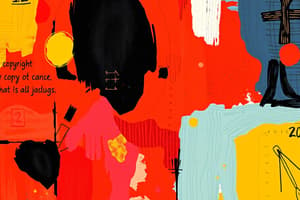Podcast
Questions and Answers
¿Cuál de los siguientes no es un propósito permitido para el uso justo de material protegido por derechos de autor?
¿Cuál de los siguientes no es un propósito permitido para el uso justo de material protegido por derechos de autor?
- Uso no comercial educativo
- Uso de por vida (correct)
- Informe de noticias
- Crítica
¿Cuál de los siguientes factores se considera al determinar si se aplica el uso justo?
¿Cuál de los siguientes factores se considera al determinar si se aplica el uso justo?
- La ubicación del autor del material
- El estilo de presentación del trabajo
- La fecha de creación de la obra
- La naturaleza de la obra protegida (correct)
¿Cuál es la ventaja principal de registrar un copyright?
¿Cuál es la ventaja principal de registrar un copyright?
- Fortalecer las reclamaciones legales y proporcionar un registro oficial de propiedad (correct)
- Facilitar la creación de componentes adicionales de la obra
- Eliminación del derecho de autor anterior
- Obtener derechos automáticos sobre la obra
¿Cuál de las siguientes afirmaciones sobre el copyright es verdadera?
¿Cuál de las siguientes afirmaciones sobre el copyright es verdadera?
¿Cuál de los siguientes efectos se considera al evaluar el uso justo?
¿Cuál de los siguientes efectos se considera al evaluar el uso justo?
¿Qué protege el copyright en una obra original?
¿Qué protege el copyright en una obra original?
¿Cuándo se establece automáticamente la protección del copyright?
¿Cuándo se establece automáticamente la protección del copyright?
¿Cuál de las siguientes afirmaciones sobre la propiedad del copyright es correcta?
¿Cuál de las siguientes afirmaciones sobre la propiedad del copyright es correcta?
¿Cuál es la duración típica de la protección del copyright para obras creadas después de una fecha específica?
¿Cuál es la duración típica de la protección del copyright para obras creadas después de una fecha específica?
¿Qué constituye una infracción de copyright?
¿Qué constituye una infracción de copyright?
¿Qué es la doctrina de uso justo (fair use)?
¿Qué es la doctrina de uso justo (fair use)?
¿Qué obras NO están protegidas por el copyright?
¿Qué obras NO están protegidas por el copyright?
¿Qué ocurre con los derechos de copyright en un acuerdo de trabajo por encargo?
¿Qué ocurre con los derechos de copyright en un acuerdo de trabajo por encargo?
Flashcards
Uso justo
Uso justo
El uso justo permite el uso limitado y transformador de material protegido por derechos de autor para fines como la crítica, el comentario, los informes de noticias, la enseñanza, la investigación o la erudición.
Factores del uso justo
Factores del uso justo
Los tribunales consideran cuatro factores para determinar el uso justo: el propósito y el carácter del uso, la naturaleza de la obra protegida por derechos de autor, la cantidad y la importancia de la parte utilizada en relación con la obra protegida por derechos de autor en su conjunto, y el efecto del uso sobre el mercado potencial o el valor de la obra protegida por derechos de autor.
Registro de los derechos de autor
Registro de los derechos de autor
El registro de los derechos de autor con la oficina o agencia de derechos de autor correspondiente es aconsejable para fortalecer las reclamaciones legales.
Beneficios del registro de los derechos de autor
Beneficios del registro de los derechos de autor
Signup and view all the flashcards
Evidencia y ventajas del registro
Evidencia y ventajas del registro
Signup and view all the flashcards
Derecho de autor
Derecho de autor
Signup and view all the flashcards
Protección de la expresión, no de la idea
Protección de la expresión, no de la idea
Signup and view all the flashcards
Derechos exclusivos del autor
Derechos exclusivos del autor
Signup and view all the flashcards
Protección automática del copyright
Protección automática del copyright
Signup and view all the flashcards
Ejemplos de obras protegidas por copyright
Ejemplos de obras protegidas por copyright
Signup and view all the flashcards
Excepciones al copyright
Excepciones al copyright
Signup and view all the flashcards
Propiedad del copyright
Propiedad del copyright
Signup and view all the flashcards
Transferencia de derechos de autor
Transferencia de derechos de autor
Signup and view all the flashcards
Study Notes
Copyright Overview
- Copyright is a legal right granted to the creator of original works of authorship, including literary, dramatic, musical, and other intellectual works.
- It protects the expression of an idea, not the idea itself. The concept can be copied, but the specific way it's expressed is protected.
- Copyright grants exclusive rights to the creator for a specific period, enabling control over reproduction, distribution, display, and adaptation of their work.
Copyright Subject Matter
- Copyright protection extends to original works of authorship fixed in any tangible medium of expression, now known or later developed.
- This protection is automatic upon creation and does not require formal registration.
- Examples include literary works (books, articles, poems), dramatic works (plays, screenplays), musical works (songs, scores), and other intellectual works like computer programs, photographs, and architecture.
- Works that are not original, such as facts, ideas, procedures, processes, systems, methods of operation, concepts, principles, or discoveries, are not copyrightable.
Copyright Ownership
- The initial owner of copyright is typically the author of the work.
- Exceptions exist, like work-for-hire agreements where the employer usually holds the copyright.
- Ownership rights can be transferred, licensed, or assigned with legal agreements.
Copyright Term
- Copyright protection lasts a specific period.
- Duration varies based on the work's creation date, the author's death, and other legal factors.
- For works created after a certain date, the term is typically the life of the author plus a specific number of years after their death.
- Works made for hire, regardless of the author, have a fixed term.
Copyright Infringement
- Infringement occurs when someone violates the exclusive rights of the copyright holder without permission.
- This includes unauthorized copying, distribution, display, or adaptation of the protected work.
- Penalties for infringement can include financial damages, court orders to stop infringement, and potential criminal prosecution.
Fair Use Doctrine
- The fair use doctrine offers a limited exception to copyright exclusivity.
- Fair use allows limited and transformative use of copyrighted material for criticism, comment, news reporting, teaching, scholarship, or research.
- Courts consider four factors in determining fair use:
- The purpose and character of the use (commercial or non-profit educational).
- The nature of the copyrighted work.
- The amount and substantiality of the portion used.
- The effect of the use on the potential market for or value of the copyrighted work.
Copyright Registration
- Registering a copyright with the relevant office strengthens legal claims.
- Registration provides an official record of ownership, aiding in infringement lawsuits, although copyright protection exists independently.
- It offers evidence of the copyright date and provides benefits in legal procedures.
Studying That Suits You
Use AI to generate personalized quizzes and flashcards to suit your learning preferences.




